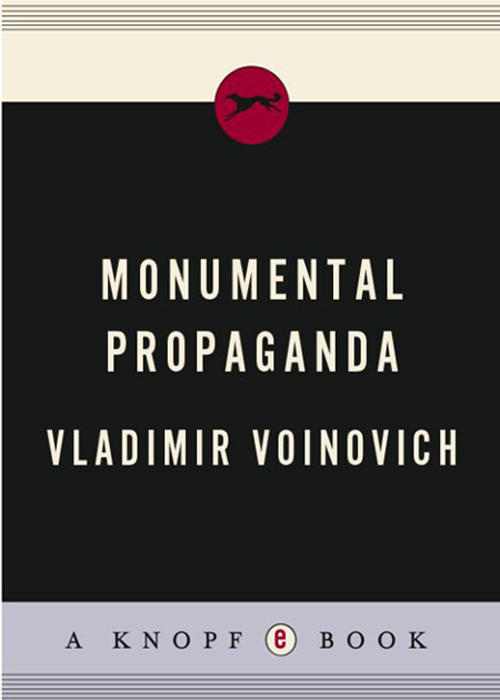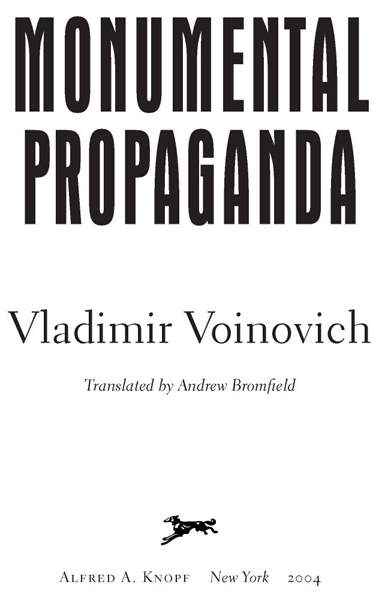Monumental Propaganda


Table of Contents
PART TWO - WE SING AS WE FIGHT AS WE CONQUER
PART THREE - VAIN EXPECTATIONS
Â
Â
In loving memory of my wife, Irina
PROLOGUE
When I opened the envelope, out fell a newspaper clipping about the size of a matchbox. On it, in a black border of mourning, a group of comrades from the city of Dolgov informed the reader with profound regret of the tragic death of the pensioner Aglaya Stepanovna Revkina, member of the Communist Party of the Soviet Union since 1933, veteran of the Great Patriotic War and outstanding social activist.
I was surprised, thinking that someone must have sent me a text from days long gone. But when I turned over the piece of paper and read “New in the Internet,” “Paging Services” and “Tax Inspec” (the end of the word was cut off), I was even more surprised. Who on earth would want to mention membership in the CPSU nowadays?
The anonymous individual who forwarded the notice had evidently expected it would strike a chord with me, and he was right. It was a long time since I had been in Dolgov; I was not aware that Aglaya had attained such an advanced age and found it hard even to imagine her alive in these times. I set out for Dolgov immediately and took up residence in the former Collective Farmers' House, now the Hotel Continental, where I stayed for about two weeks, interviewing various people who knew anything at all about the final years of Aglaya, or Oglashennaya (“the woman possessed”) or Ogloedka (“the bone gnawer”)âpeople used to modify her name in various ways, adapting it to suit her character. Her previous biography was well known to me. I had recounted part of it in my past novels
Chonkin
and
The Scheme.
Allow me, without repeating myself unduly, to remind you briefly: When she was a Komsomol member, youthful and ardent, she altered her documents to add five years or more to her age and plunged headlong into the class war. In her leather jacket and with her revolver at her side, she galloped around the local district on her horse, dekulakizing the rich and herding the poor into collective farms. After that she became the manager of the orphanage and married the district Party secretary, Andrei Revkin, whom she was later forced to sacrifice for the sublime cause. When German forces entered Dolgov in the fall of '41, Aglaya blew up the local power station while her husband, who had laid the charges, was still inside. “The motherland will not forget you!” she shouted to him down the phone as she touched the ends of the wires together.
During the war Aglaya Stepanovna commanded a partisan unit, which was awarded two decorations for distinguished service in action. After the war she herself was the district Party secretary until she was “gobbled up” by more predatory comrades. She returned to her prewar place of employment and worked once again as director of the Felix Dzerzhinsky Children's Home, where in February 1956 she was taken unawares by the historical event which provides the starting point of our narrative.
PART ONE
CONSOLIDATION
1
In February 1956, on the day the Twentieth Congress of the CPSU ended, in the Dolgov District House of the Railroad Worker, Khrushchev's secret speech about Stalin's personality cult was read to the local Party core of activists. The reader was the second secretary of the district Party committee, Pyotr Klimovich Porosyaninov, a plump, well-nourished, red-cheeked, bald man with thick, moist ears covered in whitish bristlesâhis surname, with its obvious resemblance to the Russian word for “piglet,” suited him very well. In fact, in Dolgov there were many people with names that had meanings. There was even a period when the town possessed simultaneously a head of police called Tiuryagin (an obvious hint at the word “tiuryaga,” or jail), a public prosecutor called Strogii (meaning “strict”) with a deputy who rejoiced in the name of Vorovaty (“light-fingered”!), a judge called Shemyakin (reminiscent of the seventeenth-century hanging judge Shemyaka) and a head of the department of public education called Bogdan Filippovich Nechitailo (a surname which could be interpreted to mean “illiterate”).
Porosyaninov read slowly, smacking his lips together loudly as though he were eating cherries and spitting out the pits. At the same time, he lisped and stammered over every word, especially if it was a foreign one.
As Porosyaninov read, the core of Party activists listened in silence, their faces tense, their thick necks and the backs of their skulls shorn in semiâcrew cuts.
Then they asked the speaker questions: Would there be a purge of the Party? And what should they do with the portraits of Stalin, take them off the walls and rip them out of the books as they had done many times before with former leaders of the Revolution and heroes of the Civil War? Porosyaninov involuntarily turned his head and squinted sidelong at the portrait of Lenin, then shivered and said that no purge was expected and there was no need to go overboard with the portraits. Although a certain number of individual actions taken by Stalin had been incorrect, he was and remained a distinguished member (that was the phrase the speaker used) of our Party and the world communist movement, and no one intended to deny him due recognition for his services.
Aglaya Revkina, who had been through so much in her life, proved to be unprepared for a blow like this. As they were leaving the club, several people heard her declare loudly, without addressing anyone in particular: “Such filth! Such terrible filth!”
Since on that particular evening the street was not covered in filthâin fact, it was cold and there was a blizzard swirling the snow about, so that everything could more accurately have been described as pure whiteâno one took Aglaya's words literally.
“Yes, yes,” said Valentina Semenovna Bochkareva, the planner from the Collective Farm Technical Unit, backing her up. “What people we put our faith in!”
Elena Muravyova (secret-agent alias “Mura”) reported this fleeting dialogue to the local department of the Ministry of State Security, and her report was confirmed by Bochkareva herself during an interview of a prophylactic nature that was conducted with her.
But Bochkareva had misunderstood Aglaya. Her words about filth had indeed been intended in a figurative sense, and not the one in which Bochkareva had taken them.
When she got home, Aglaya was absolutely beside herself. No, it was not Stalin's crimes but the criticism of him that was what had astounded her most of all. How dare they? How dare they? She walked around all three rooms of her flat, beating her tough little fists against her tough little hips and repeating aloud the same words, addressed to her invisible opponents, over and over again: “How did you dare? Who do you think you are? Who are you to raise your hand against him?”
“And you, disdainful descendants . . .”âLermontov's line, which she thought she had forgotten long ago, came drifting out from some dark corner of her memory . . .
She had never believed in God, but she would not have been surprised in the least if Porosyaninov's tongue had withered or his nose had fallen off or he had been paralyzed by a stroke in the middle of giving his speech. The words he had uttered in the House of the Railroad Worker had been too absolutely blasphemous.
She had never believed in a God in heaven, but her earthly god was Stalin. His portrait, the famous one with him lighting up his pipe, holding a lighted match close to the slightly singed mustache, had hung over her writing desk since the times before the war, and during the war it had traveled the partisan forest trails with her and then returned to its place. A modest portrait in a simple limewood frame. In moments of doubt over her most startlingly dramatic actions, Aglaya would raise her eyes to the portrait, and Comrade Stalin seemed to screw up his own eyes slightly and urge her on with his kind and wise smile: Yes, Aglaya, you can do that, you must do it, and I believe that you will do it. Yes, she had been forced to make some difficult decisions in her lifeâharsh, even cruel, decisions concerning various peopleâbut she had done it for the sake of the Party, the country, the people and the future generations. Stalin had taught her that for the sake of the sublime idea it was worth sacrificing everything, and no one could be pitied.
Of course, she respected the other leaders as well, the members of the Politburo and the secretaries of the Central Committee, but nonetheless she thought of them as just people. Very clever and bold, utterly devoted to our ideals, but people. They could make mistakes in their thoughts, words and actions, but only he was ineffably great and infallible, and his every word and every action expressed such transcendent genius that his contemporaries and the generations to come should accept them as unconditionally correct and absolutely binding.
